Date: 26 November 2013
Secondary metabolites, structure diagram: Trivial name – Dihydroflavoglaucin
Copyright: n/a
Notes:
Species: A. ruberSystematic name: Benzaldehyde, 2-heptyl-3,6-dihydroxy-5-(3-methylbutyl)- (9CI)Molecular formulae: C19H30O3Molecular weight: 306.44Chemical abstracts number: 74886-30-9Selected references: Hamasaki, Takashi; Kimura, Yasuo; Hatsuda, Yuichi; Nagao, Minako. Structure of a new metabolite, dihydroauroglaucin, produced by Aspergillus chevalieri. Agricultural and Biological Chemistry (1981), 45(1), 313-14.
Images library
-
Title
Legend
-
The chest x-ray shows a patient who had a left lung transplanted in May 2003 for cryptogenic fibrosing alveolitis, which was diagnosed post-transplant as sarcoidosis.
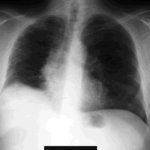
-
Gross pathology demonstrating the great pleural thickness and two cavities (upper lobe and superior segment of lower lobe) with fragments of fungal mass.

-
Histopathological appearance of a fungus ball. Note a conidial head resulting from fungal exposure to the air.
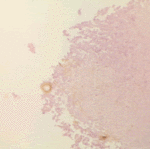
-
Histopathological appearance of a fungus ball caused by Scedosporium apiospermum. The presence of anneloconidia differentiates it from Aspergillus.

-
Chronic necrotising aspergillosis. Hyaline hyphal and calcium oxalate crystals obtained by needle aspirate biopsy from a diabetic patient with chronic necrotizing aspergillosis caused by Aspergillus niger (Papanicolaou, x 100).
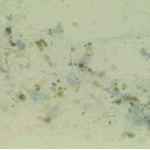
-
Aspergillus niger fungus ball and acute oxalosis. Higher magnification of adjacent replicate section.
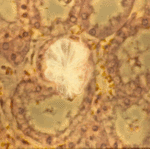
-
Oxalate crystals within renal tubuli (H&E, phase contrast, x 100). This patient developed acute oxalosis.
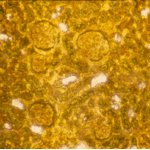
-
Lung surface. Fungus ball, severe parenchymal fibrosis and pleural thickening.



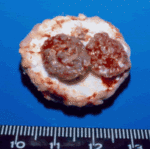 ,
, 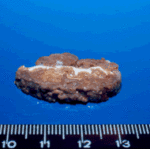
 ,
, 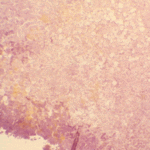 ,
, 